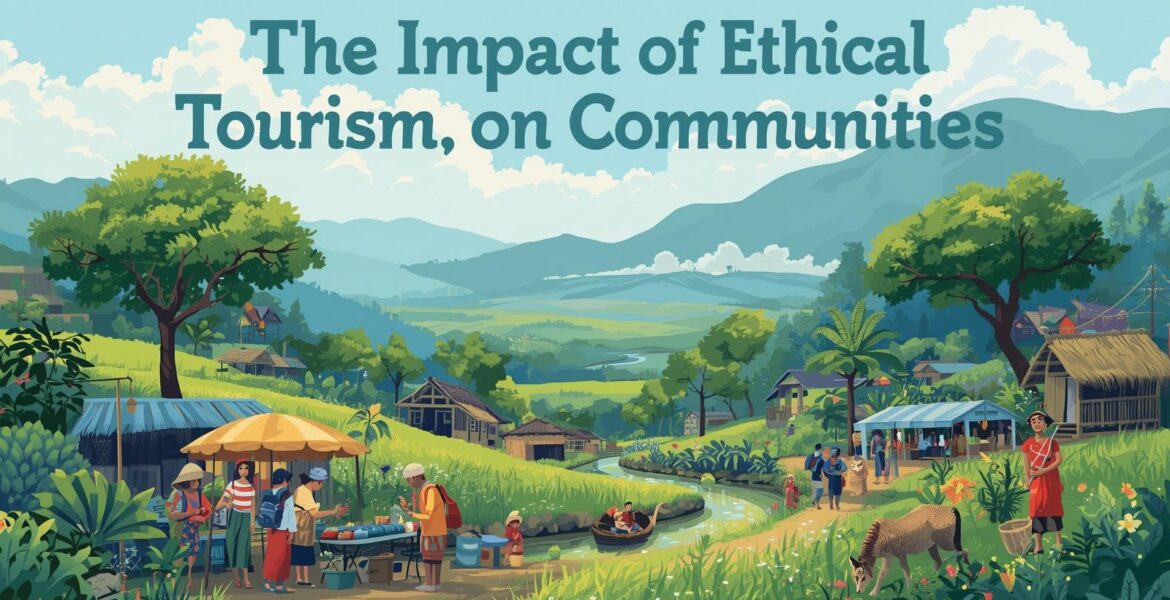In the age of mass tourism, where the allure of popular destinations often overshadows the subtler charms of lesser-known locales, ethical tourism emerges as a beacon of hope. This mindful approach to travel emphasizes respect for local cultures, environments, and economies, fostering a more equitable exchange between visitors and host communities. As we explore the impact of ethical tourism on communities, we delve into the ways this practice enriches both travelers and the places they visit.
Ethical tourism, often synonymous with responsible tourism and sustainable travel, is rooted in the idea of minimizing negative impacts while maximizing positive contributions to the environment and local communities. It calls for a conscious effort to travel in ways that prioritize the well-being of the destination’s inhabitants and ecosystems.
Principles of Responsible Tourism
- Respect for Local Culture: Engaging with local traditions and customs fosters mutual respect and understanding. Travelers are encouraged to learn about and participate in cultural practices, promoting cultural preservation.
- Environmental Stewardship: Ethical tourism advocates for the protection of natural habitats and wildlife. By choosing eco-friendly accommodations and activities, travelers can minimize their ecological footprint.
- Economic Support: Supporting local businesses and artisans ensures that tourism dollars benefit the community. This approach helps sustain local economies and empowers residents.
Benefits of Ethical Tourism for Communities
Communities that embrace ethical tourism practices often experience a range of benefits, from economic growth to cultural revitalization.
Economic Empowerment
One of the most tangible impacts of ethical tourism is economic empowerment. By prioritizing local businesses, travelers contribute directly to the financial health of the community. This includes staying in locally-owned accommodations, dining at family-run restaurants, and purchasing handmade crafts. This influx of revenue can lead to job creation and infrastructure development, improving the quality of life for residents.
Cultural Preservation
Ethical tourism encourages the preservation of cultural heritage by valuing and showcasing traditional practices. When travelers express genuine interest in local customs, it revitalizes cultural pride and can even inspire younger generations to continue these traditions. This cultural exchange enriches both the visitor’s experience and the community’s cultural landscape.
Environmental Conservation
Communities practicing ethical tourism often prioritize environmental conservation. Initiatives such as community-led conservation projects and eco-tourism activities help protect natural landscapes and wildlife. In turn, this attracts environmentally conscious travelers who wish to explore pristine environments responsibly.

Challenges and Considerations
While the benefits of ethical tourism are numerous, it is not without challenges. Communities must navigate the delicate balance between welcoming tourists and preserving their way of life.
Overcoming Cultural Misunderstandings
Travelers must approach their journeys with an open mind and a willingness to learn. Misunderstandings can arise from cultural differences, but they can be mitigated through education and respectful engagement. Ethical tourism encourages travelers to seek out authentic experiences while being mindful of cultural sensitivities.
Sustainable Infrastructure Development
As tourism grows, so does the need for sustainable infrastructure. Communities must plan for the influx of visitors in a way that minimizes environmental impact. This may include developing eco-friendly accommodations, improving waste management systems, and ensuring that tourism does not strain local resources.
Embracing Ethical Tourism: Practical Tips for Travelers
For those inspired to embrace ethical tourism, there are several practical steps to take:
- Research Your Destination: Before traveling, learn about the local customs, language, and environmental challenges. This knowledge will enrich your experience and help you engage more meaningfully with the community.
- Choose Eco-Friendly Options: Opt for accommodations and tour operators that prioritize sustainability. Look for certifications such as LEED or Green Globe to ensure your choices align with ethical tourism principles.
- Support Local Economies: Dine at local restaurants, shop at local markets, and participate in community-led tours. Your spending can have a direct positive impact on the community.
- Be Mindful of Your Impact: Always be conscious of your environmental footprint. Practice Leave No Trace principles, conserve water and energy, and respect wildlife.
The Future of Ethical Tourism
As travelers increasingly seek out meaningful and authentic experiences, ethical tourism will continue to grow in importance. This approach not only enriches the travel experience but also fosters positive change in communities around the world. By prioritizing responsible tourism, we can contribute to a more equitable and sustainable future for all.
In conclusion, ethical tourism is a powerful tool for nurturing the delicate balance between exploration and preservation. As we journey to new destinations, let us do so with intention, respect, and a commitment to leaving a positive legacy in our wake. Through ethical tourism, we can build bridges of understanding and connection, ensuring that the world’s hidden gems remain cherished for generations to come.


